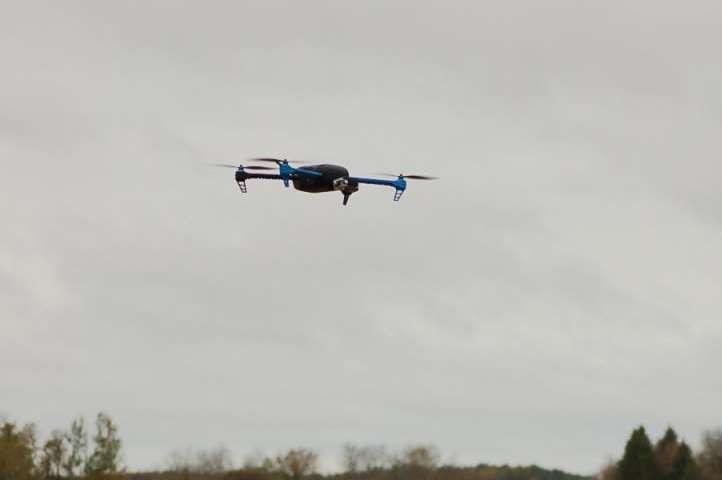A drone returns from a flight tracking black bears in Minnesota. Photo by Jessie Tanner/University of Minnesota
SAINT PAUL, Minn., Aug. 13 (UPI) -- Bears don't appear fazed by presence of unmanned aerial vehicles, or drones. But a new study suggests the mammals exhibit a physiological stress response when UAVs (to them, simply UFOs) hover overhead.
Drones are increasingly common in U.S. skies. But it's not just YouTube videographers controlling them. More and more researchers are relying on UAVs to track, observe and study wildlife.
Now, scientists are beginning to wonder how they might be affecting animals with their buzzing.
To find out, researchers at the University of Minnesota installed bio-trackers on several free-roaming American black bears in the woods of northwestern Minnesota. GPS collars allowed the biologists to track the bears and fly drones over their heads, while cardiac biologgers helped the team measure the bears' reaction. The team's findings were recently published in the journal Current Biology.
The new research footage confirmed what most of the biologists had already seen on film, drones don't appear to scare bears away. Watched bears didn't typically run away or hide. Out of 18 flights, the drone's presence only appeared to influence bear behavior twice.
But the biologgers showed a significant increase in the bears' heart rates. One bear's heartbeat shot up to four times its resting rate.
"Some of the spikes in the heart rate of the bears were far beyond what we expected," Mark Ditmer, a post-doctoral researcher in the university's Department of Fisheries, Wildlife and Conservation Biology, explained in a press release. "We had one bear increase her heart rate by approximately 400 percent -- from 41 beats per minute to 162 beats per minute. Keep in mind this was the strongest response we saw, but it was shocking nonetheless."
The good news is, the bears' heart rates recovered rather quickly after the UAVs flew away. But Ditmer and his colleagues say the growing use of drones in and above wilderness warrants more study -- and new guidelines that take into account the potential stress caused to watched animals.
"UAVs hold tremendous potential for scientific research and as tools for conservation," Ditmer said. "However, until we know which species are tolerant of UAVs, at what distance animals react to the presence of UAVs, and whether or not individuals can habituate to their presence, we need to exercise caution when using them around wildlife."















